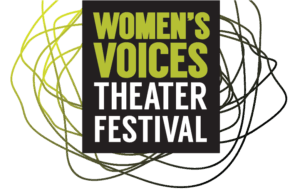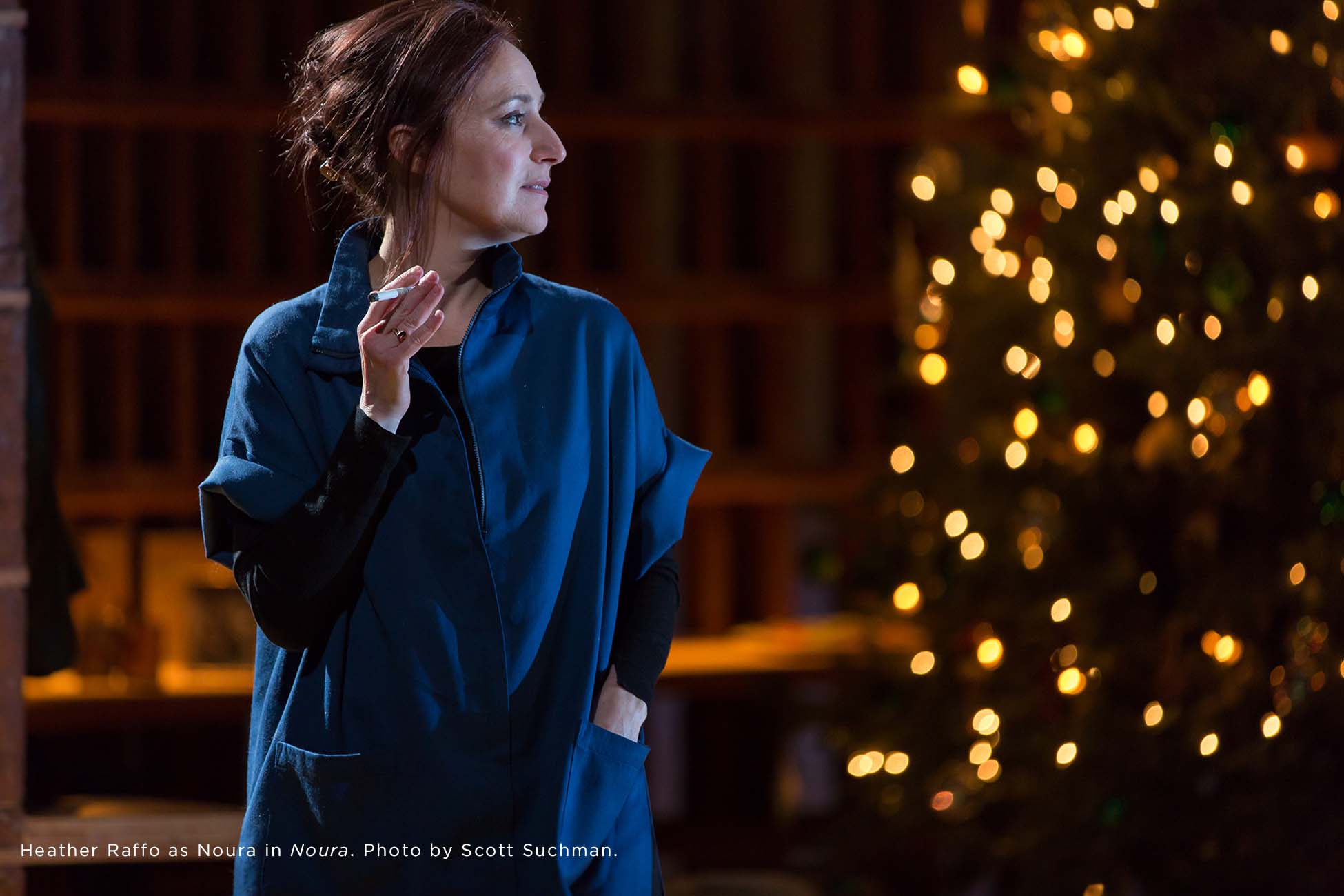Noura, the story of a Chaldean Christian refugee from Iraq, is a magnificent production. The acting is first-rate, the technical aspects flawless, the whole experience complex and full of deep meaning. Directed by Joanna Settle, it contains some of the finest writing in the Women’s Voices Theater Festival. In addition to extensive research, playwright Heather Raffo spent three years leading workshops with Arab American women in New York City, discussing their efforts to bridge the gap between the “rugged individualism” of American culture and the Middle Eastern emphasis on community. The work has been developed and tested before many diverse audiences. In addition, Noura draws attention to an important crisis of our time, the plight of the world’s refugees.
Yet for me, some aspects of it were unsatisfying. Let me explain. The Nora of A Doll’s House (Henrik Ibsen, 1879) whom our Noura is based upon, is a thoughtless, pampered wife. She makes a mistake and ends up learning some unpleasant truths about herself and her marriage. Her husband, Torvald, a lawyer, has just been selected as Bank Manager. But he is very ill and needs a revivifying vacation. There is no money yet for the family (they have three young children) to go away. On a whim, she borrows it from a local clerk, Krogstad, employed by her husband. She forges her father’s signature as guarantor.
Torvald calls her his little squirrel, patronizes her, laughs at her efforts to be serious, but adores her beauty and charm. He makes comments such as “Just like a woman,” and cautions her not to worry her head about business matters. Nora even refers to herself as a skylark and dances for him.
When he finds out she has kept the secret of the IOU from him, he is enraged. He chastises her as a dishonest woman and an unfit mother. For her part, she hoped he would unselfishly take the blame. When he does not, she falls out of love with him. She walks out, slamming the door, and leaving her children to discover who she is outside of her stifling marriage.
A Doll’s House is a great play, and Nora became a feminist heroine in some circles. But as a mother, I could never understand how she could leave her children. I thought, rightfully or not, that Ibsen, being a man, had never understood the power motherhood has over a woman. So Nora’s final gesture, though celebrated in theatrical history, has, for me, always fallen a bit flat.

There are similarities between the two women. Both are devoted wives with adoring husbands. Both have come out of a period of struggle into relative ease. Both are mothers, and both have secrets which terrify them. Still, the differences are notable too. Noura survived the horrors of the Iraq war. She has feared for her life. She is still haunted by the violence in her past. ISIS is ravaging her native city, Mosul.
Still, I found her a bit…well, self-satisfied. Her situation now is more than comfortable. She is judgmental of Maryam, the young refugee whom she attempts to adopt from Iraq. She behaves not like a traumatized person, but like a privileged woman playing at being a trauma survivor.
“Gorgeously-strung dialogue that built to an electrifying climax…” Read Elizabeth Ballou’s review of Noura here.
There is no doubt that Noura has moments of selflessness and compassion. Her love for her son is beautiful to see. Eventually she pleads her case with her husband to love and support the young Iraqi fugitive, Maryam (Dahlia Azama). Throughout, she attempts to recapture a sense of family. Rafa’a (Matthew David), an old family friend (who is of course in love with her) comes for Christmas dinner. She wants her husband and son to go to Mass with her, although only Yazen does. She is designing, for her husband, a home for his sisters which they will never be able to live in. She listens to the radio on Christmas Day to hear the news from Iraq. But as her secrets begin to be revealed, the plot begins to seem forced and less credible.
Her secret seems, to me, difficult to keep from a husband during a long, committed marriage. It also seems odd that given Tareq’s obvious devotion, she didn’t simply tell him the truth a long time ago. The end, when it comes, is abrupt and doesn’t seem realistic. Again, A Doll’s House, brilliant as it is, takes control and leads our Noura into directions that it seems she would never believably go.
Nora, in Ibsen’s play, becomes more and more frightened. She has no option but marriage. Her secret is part of an effort to save her family. Noura, on the other hand, is a confident professional whose secret seems to protect mostly herself. Her choices as a mother are difficult to understand. As much as I tried to, I could not believe in her tragic past or her broken heart.
But don’t take my word for it. Enjoy the play and decide for yourself.
Playwright: Heather Raffo; Director: Joanna Settle; Scenic Designer: Andrew Lieberman; Costume Designer: Tilly Grimes; Lighting Designer: Masha Tsimring; Sound Designer: Obadiah Eaves; Recorded Voices: Ni Qasey.
Running Time: 90 minutes, with no intermission.
Noura, by Shakespeare Theatre Company, plays through March 11 at the Lansburgh Theatre – 450 7th St NW, Washington, DC 20004. For tickets, call (202) 547-1122 or go online. The show is part of the Women’s Voices Theatre Festival.
Heather Raffo (Playwright)

Most recently, her libretto for the opera Fallujah was heard as part of Kennedy Center’s International Theater Festival. It then received its world premiere at Long Beach Opera in March of 2016 and opened at New York City Opera later that year. A film was made of the opera, as well as a documentary titled Fallujah: Art, Healing and PTSD.
Heather’s newest play, Noura, just won Williamstown Theatre Festival’s prestigious Weissberger Award. Noura came out of three years of workshops with Arab American women living in New York City, where Heather explored the themes of identity and belonging through her personal narrative initiative titled Places of Pilgrimage. In response to the participants’ many harrowing stories of leaving home, Heather shared with them Ibsen’s A Doll’s House. In tackling the iconic character of Noura, Raffo’s workshop provided a rare opportunity for women to discuss the contemporary challenge of being a modern woman who must bridge ties to both America and the Middle East. Noura was further developed at Georgetown University’s Laboratory for Global Performance and Politics with refugee and Middle East policy experts. Further workshops were supported by McCarter Theatre, Epic Theatre Ensemble and our nation’s first Arab American Museum in Dearborn, Michigan. Noura will receive its world premiere at the Shakespeare Theatre Company in D.C. in February 2018, before traveling to the Middle East for production in Abu Dhabi.
Raffo is the recipient of multiple grants from the Doris Duke Charitable Foundation to use theater as a means of bridge-building between her Eastern and Western cultures. She continues to grow her storytelling workshop, Places of Pilgrimage, taking it to universities and community centers both in America and the Middle East. Clips of participants’ work from her New York workshop have been shared online through the organizations Bridges of Understanding and Refugees Deeply, as a means to connect the stories of young Middle Eastern women with their peers globally. Raffo continues her focus on cross-cultural work by speaking at universities across America and internationally. Her work has taken her from classrooms in Tampa to the U.S. Islamic World Forum in Qatar, and from the Mercantile Library in Cincinnati to the Rumi Festival in Oslo. She is a proud member of Epic Theatre Ensemble’s Artistic Advisory Council and to her decade-long collaboration with Georgetown’s Laboratory for Global Performance and Politics.





